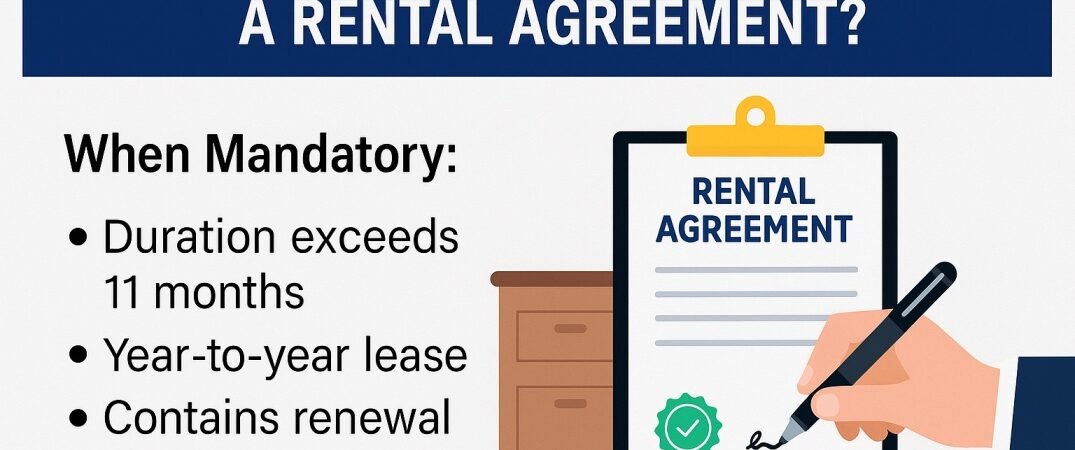If you’re renting out a home or moving into one, there’s one document that matters as much as the house itself — the rental agreement.
But here’s a common question:
👉 “Is it mandatory to register a rental agreement in India?”
Let’s break it down in simple legal terms — with no jargon, only clarity.
📜 Is It Mandatory to Register a Rental Agreement in India?
Yes — but only in specific cases.
As per Section 17 of the Registration Act, 1908, it is mandatory to register a rental or lease agreement if:
• The tenure of the agreement exceeds 11 months, or
• The agreement is for a year-to-year lease, or
• It contains a renewal clause that extends beyond 12 months
If your agreement is for 11 months or less, you’re allowed to get it notarized instead of registered, although registering is always safer.
⚖️ Legal Backing:
• Section 17 of the Registration Act, 1908 – Covers when agreements must be registered.
• Section 49 of the same Act – States that an unregistered agreement cannot be used as evidence in court if required.
🧾 Notarized vs. Registered Rental Agreement – What’s the Difference?
Feature Notarized Agreement Registered Agreement
Legal Validity Valid but not strong in court Fully valid and legally enforceable
Stamp Duty Typically not paid Must be paid as per state law
Admissible in Court Limited admissibility Admissible and enforceable
Ideal For Short-term rentals Long-term leases or high-value properties
Location Proof Use Often acceptable Always accepted
📌 Why Should You Register a Rent Agreement?
Even if your rental is for 11 months or less, registering the agreement offers major advantages:
• ✅ It gives strong legal protection to both landlord and tenant
• ✅ Helps resolve future disputes on rent, tenure, deposit, maintenance, etc.
• ✅ Serves as a solid address proof for official purposes
• ✅ Helps in income tax filings (especially for tenants claiming HRA)
🧮 Stamp Duty and Registration Charges
These charges vary from state to state. Here’s a general idea:
• Stamp Duty: Around 0.25% to 0.5% of total rent + deposit
• Registration Fee: Usually around ₹1,000 (varies by state)
You’ll also need:
• 2 passport-size photographs of both parties
• Proof of identity (Aadhaar, PAN, etc.)
• Ownership proof for the landlord
• Power of Attorney, if executed by an authorised representative
🏢 How to Register a Rent Agreement in India: Step-by-Step
Here’s the process in plain English:
1. Draft the agreement with all terms clearly stated:
• Rent amount
• Tenure
• Security deposit
• Maintenance charges
• Lock-in period
• Termination clause
• Subletting clause
2. Print on Stamp Paper of the appropriate value (as per your state).
3. Visit the Sub-Registrar Office (in the jurisdiction of the rented property).
4. Both landlord and tenant must be physically present with original ID proofs.
5. Submit the agreement for registration along with fees.
6. Collect the registered document after official processing (usually within a week).
💡 Tip:
Some states (like Maharashtra and Delhi) now allow e-registration for rent agreements of 11 months. This saves time and visits to the sub-registrar.
🤝 Consequences of Not Registering When Mandatory
If you skip registration for agreements longer than 11 months:
• Your agreement won’t be valid in court in case of a dispute
• You may lose legal protection for issues like eviction, non-payment, or misuse of premises
• The agreement may be treated as invalid during tax scrutiny
So, it’s best to play it safe — register the rental agreement when required.
✅ Summary Checklist: When and How to Register
✔️ Mandatory Registration:
• Duration > 11 months
• Contains renewal clause
• Year-to-year lease
📍 Must Have:
• Properly drafted rent agreement
• Stamp paper of correct value
• Identity and address proofs
• Sub-registrar office visit (unless online option available)
📣 Call to Action: Need Help Drafting or Registering a Rent Agreement?
We are property law experts based in India with deep experience in rental documentation.
If you’re unsure about:
• Whether your agreement should be registered
• How to draft a legally strong rent agreement
• Stamp duty or registration fee in your state
• Online vs. offline registration process
📧 Email us at: ranjinijayaram@rjpropertylaw.com
📱 Call or WhatsApp: +91 80884 17193
🌐 Visit: www.rjpropertylaw.com
Let us handle the legalities while you move in with peace of mind.

